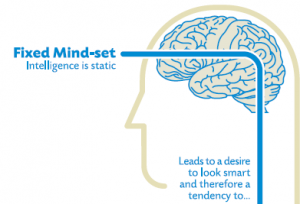Strong Fixed Mindset = 0-20 points
Some believe their success is based on innate ability; these are said to have a “fixed” theory of intelligence (fixed mindset). Others, who believe their success is based on hard work, learning, training and doggedness are said to have a “growth” or an “incremental” theory of intelligence (growth mindset). Individuals may not necessarily be aware of their own mindset, but their mindset can still be discerned based on their behavior. It is especially evident in their reaction to failure. Fixed-mindset individuals dread failure because it is a negative statement on their basic abilities, while growth mindset individuals don’t mind or fear failure as much because they realize their performance can be improved and learning comes from failure. These two mindsets play an important role in all aspects of a person’s life. Dweck argues that the growth mindset will allow a person to live a less stressful and more successful life. Dweck’s definition of fixed and growth mindsets from a 2012 interview:
“In a fixed mindset students believe their basic abilities, their intelligence, their talents, are just fixed traits. They have a certain amount and that’s that, and then their goal becomes to look smart all the time and never look dumb. In a growth mindset students understand that their talents and abilities can be developed through effort, good teaching and persistence. They don’t necessarily think everyone’s the same or anyone can be Einstein, but they believe everyone can get smarter if they work at it.”
This is important because (1) individuals with a “growth” theory are more likely to continue working hard despite setbacks and (2) individuals’ theories of intelligence can be affected by subtle environmental cues. For example, children given praise such as “good job, you’re very smart” are much more likely to develop a fixed mindset, whereas if given compliments like “good job, you worked very hard” they are likely to develop a growth mindset. In other words, it is possible to encourage students, for example, to persist despite failure by encouraging them to think about learning in a certain way.
Adapted from:
Dweck, C. S. (2006). Mindset: The new psychology of success. New York: Random House Inc.
